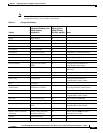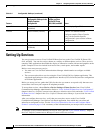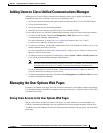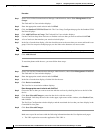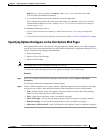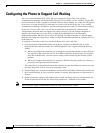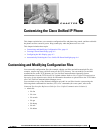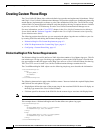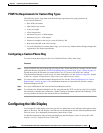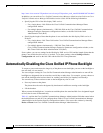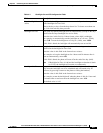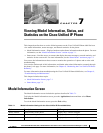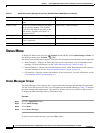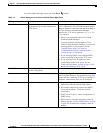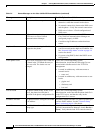
6-3
Cisco Unified IP Phone 6921, 6941, and 6961 Administration Guide for Cisco Unified Communications Manager 7.1 (SCCP)
OL-19025-01
Chapter 6 Customizing the Cisco Unified IP Phone
Configuring the Idle Display
PCM File Requirements for Custom Ring Types
The PCM files for the rings must meet the following requirements for proper playback on
Cisco Unified IP Phones:
• Raw PCM (no header)
• 8000 samples per second
• 8 bits per sample
• uLaw compression
• Maximum ring size—16080 samples
• Minimum ring size—240 samples
• Number of samples in the ring is evenly divisible by 240.
• Ring starts and ends at the zero crossing.
• To create PCM files for custom phone rings, you can use any standard audio editing packages that
support these file format requirements.
Configuring a Custom Phone Ring
To create custom phone rings for the Cisco Unified IP Phone, follow these steps:
Procedure
Step 1 Create a PCM file for each custom ring (one ring per file). Ensure the PCM files comply with the format
guidelines that are listed in the “PCM File Requirements for Custom Ring Types” section on page 6-3.
Upload the new PCM files that you created to the
Cisco TFTP server for each Cisco Unified
Communications Manager in your cluster. For more information, see the “Software Upgrades” chapter
in the Cisco U
nified Communications Operating System Administration Guide.
Step 2 Use an text editor to edit the DistinctiveRinglist.xml file. See the “DistinctiveRingList File Format
Requirements” section on page 6-2 for information about how t
o format this file and for a sample
DistinctiveRinglist.xml file.
Step 3 Save your modifications and close the DistinctiveRinglist.xml file.
Step 4 To cache the new DistinctiveRinglist.xml file, stop and start the TFTP service by using Cisco Unified
Serviceability or disable and re-enable the “Enable Caching of Constant and Bin Files at Startup” TFTP
service parameter (located in the Advanced Service Parameters).
Configuring the Idle Display
You can specify an idle display (text only; text-file size should not exceed 1M bytes) that appears on the
phone LCD screen. The idle display is an XML service that the phone invokes when the phone has been
idle (not in use) for a designated period and no feature menu is open.
For detailed instructions abo
ut creating and displaying the idle display, refer to Creating Idle URL
Graphics on Cisco Unified IP Phone at this URL:



